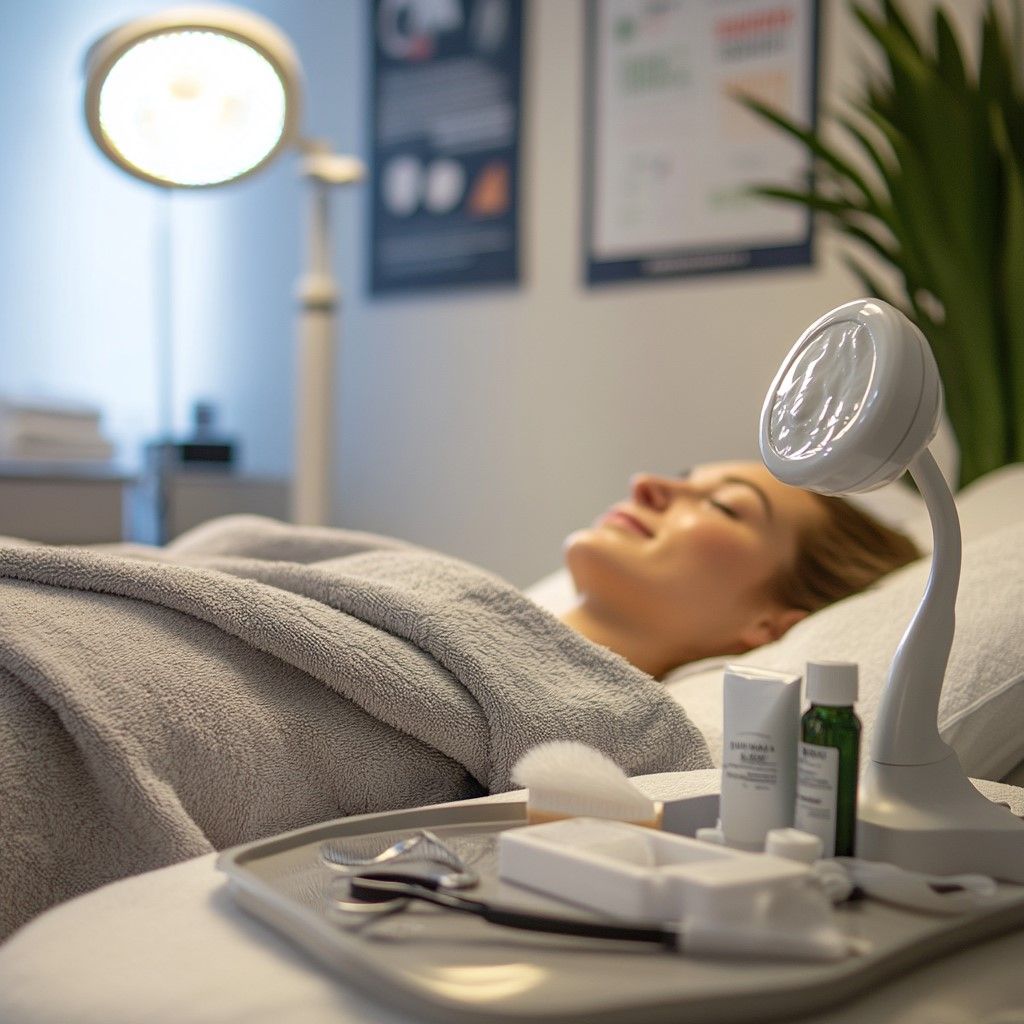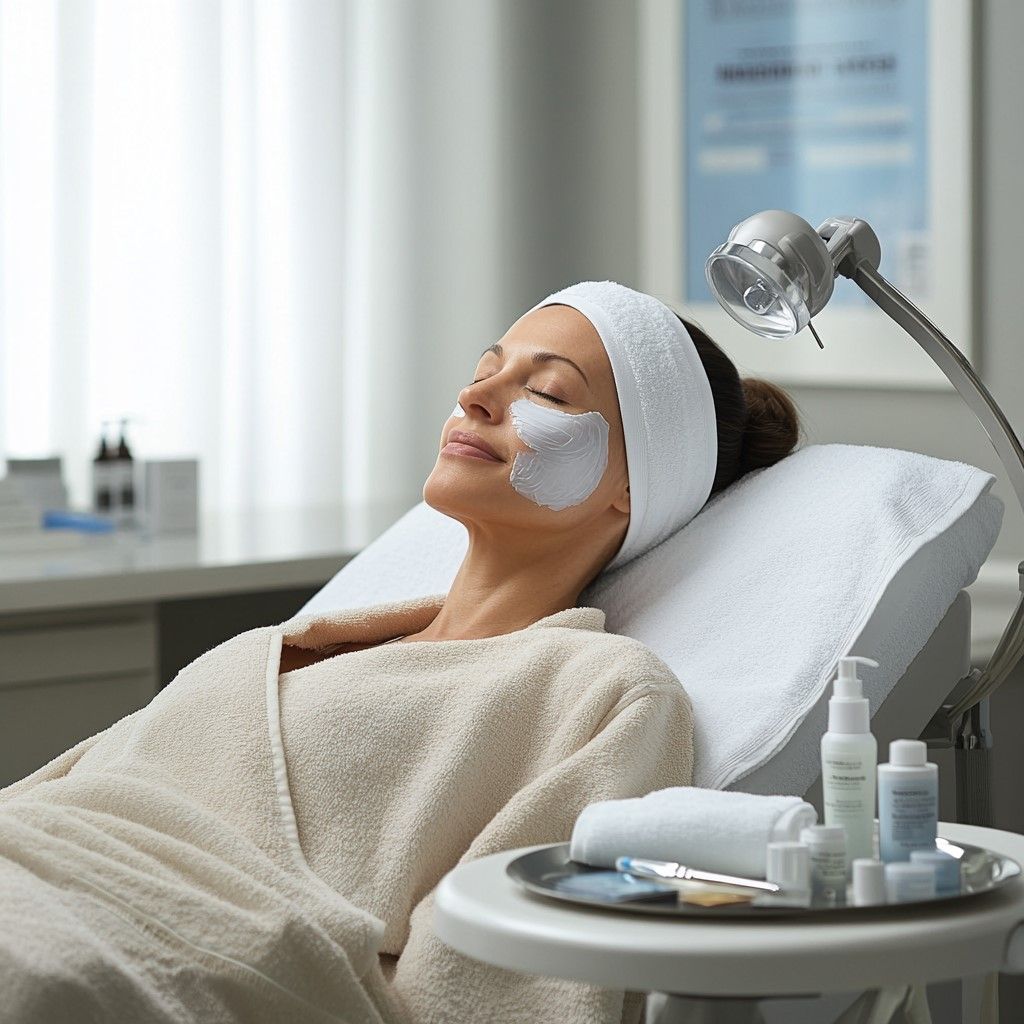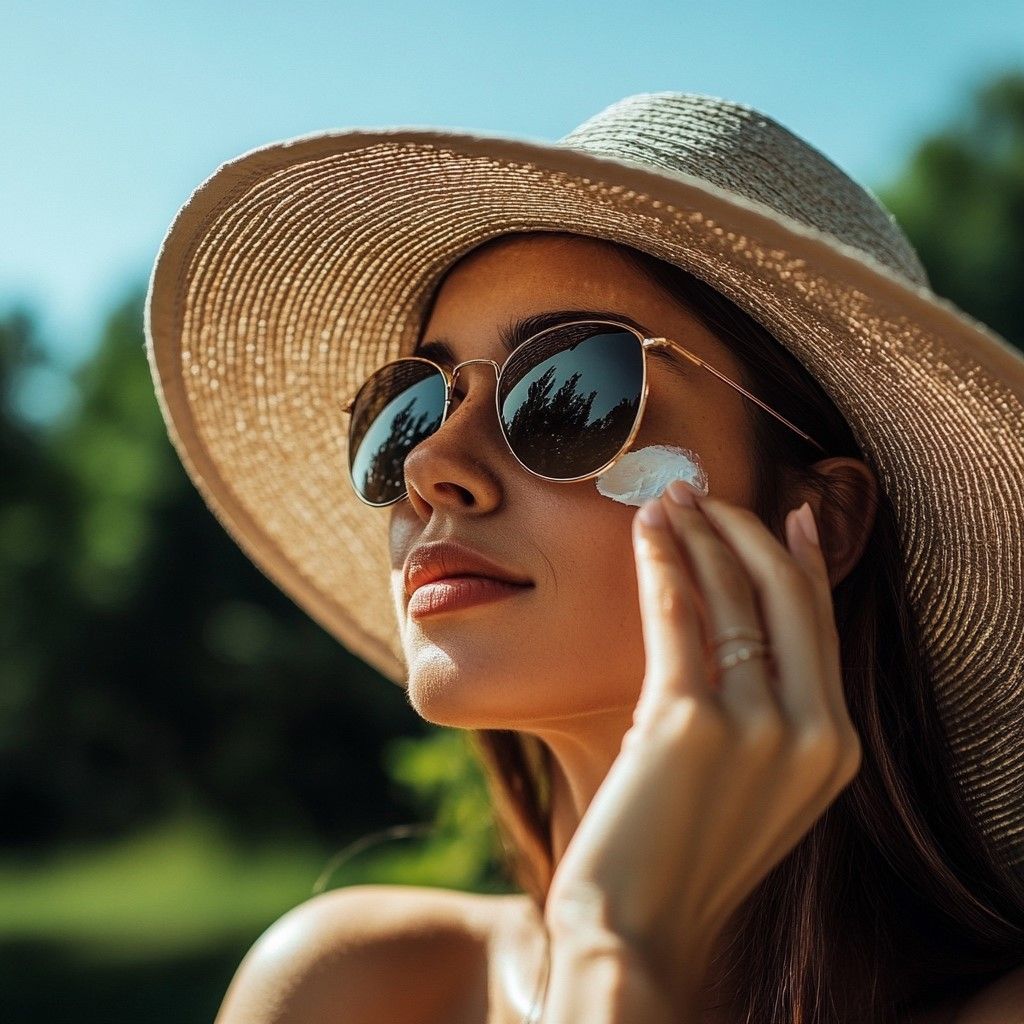Dermatology Treatment in Federal Way: 6 Ways to Clear Skin

Let’s be real - skin issues are annoying. One day it’s a breakout, the next it’s redness or dark spots that won’t budge. If you’ve tried everything and still aren’t seeing results, it might be time to consider professional dermatology treatments.
Here are seven options available in Federal Way to help you finally achieve clear skin.
Understanding Common Skin Issues
Before looking into the best treatments, let’s take a look at the most common skin concerns and what causes them.
Acne
Acne is a skin condition that causes pimples, blackheads, and cysts, usually appearing on the face, chest, and back. It results from a buildup of oil and dead skin cells that block hair follicles.
Factors contributing to acne include hormonal changes, genetics, and certain lifestyle choices. The impact of acne extends beyond physical appearance, often affecting an individual's self-esteem and mental health.
Hyperpigmentation
Hyperpigmentation is the darkening of certain skin areas due to excess melanin production. This condition can result from sun exposure, inflammation, or injuries to the skin.
In the Pacific Northwest, where residents experience varying weather conditions, sun exposure can be a significant trigger. Limiting UV exposure is crucial for preventing and reducing hyperpigmentation.
Rosacea
Rosacea is a chronic skin disorder presenting as facial redness, visible blood vessels, and sometimes small, red, pus-filled bumps. Symptoms often flare up for weeks or months and then diminish before returning. Environmental factors like extreme temperatures and excessive exposure to sunlight, along with lifestyle choices such as diet and stress, can trigger rosacea flare-ups.
Eczema
Eczema, also known as atopic dermatitis, is a common inflammatory skin condition that causes dryness, itching, and red, irritated patches. Flare-ups can be triggered by allergens, stress, weather changes, or harsh skincare products. Since eczema weakens the skin barrier, proper hydration and gentle skincare are key to managing symptoms and preventing discomfort.
Psoriasis
Psoriasis is a long-term autoimmune condition that accelerates skin cell growth, causing thick, scaly patches that can be itchy, painful, and inflamed. It usually appears on the scalp, elbows, knees, and lower back.
Triggers include stress, infections, cold weather, and certain medications. While there is no cure, treatments such as topical medications, light therapy, and lifestyle adjustments can help manage symptoms.
1. Topical Treatments for Clear Skin in Federal Way, WA

Topical treatments are usually the first step in addressing common skin concerns. Here are some of the most effective options and how they work.
Retinoids
Retinoids, derived from vitamin A, boost skin cell turnover to unclog pores and minimize acne breakouts. They are available in both over-the-counter formulations and stronger prescription versions. While effective, retinoids can cause skin irritation; thus, It's best to begin with a low concentration and gradually increase as your skin adjusts.
Benzoyl Peroxide
Benzoyl peroxide possesses antibacterial properties that target acne-causing bacteria. It helps reduce inflammation and clear existing acne lesions. To minimize potential skin irritation, begin with lower concentrations and apply sparingly, gradually increasing as your skin builds tolerance.
Azelaic Acid
Azelaic acid is a plant-based compound naturally found in grains like barley and wheat. It offers benefits for both acne and hyperpigmentation by reducing inflammation and inhibiting melanin production. Azelaic acid is generally well-tolerated, making it suitable for individuals with sensitive skin.
2. Advanced Dermatological Procedures
For more persistent skin concerns, advanced dermatological procedures can provide deeper, longer-lasting results. Here are some of the most effective options available.
Laser Therapy
Laser therapy utilizes focused light to target specific skin concerns. For acne scars and pigmentation issues, different types of lasers can resurface the skin, promoting new collagen formation and reducing discoloration. Recovery times vary depending on the laser used, but many modern treatments offer minimal downtime.
Chemical Peels
Chemical peels use a solution to exfoliate the top skin layers, uncovering smoother, clearer skin underneath. They come in varying strengths—superficial, medium, and deep—each suited for different skin concerns. Benefits include improved skin texture, reduced acne scars, and a more even skin tone.
Microneedling
Collagen induction therapy, also called microneedling, involves fine needles making micro-injuries on the skin. This process stimulates the body's natural healing response, leading to increased collagen production. It's effective in treating acne scars and enhancing overall skin texture.
3. Holistic and Naturopathic Approaches

In addition to medical treatments, holistic and naturopathic approaches can play a key role in improving skin health. Here are some natural strategies that may help.
Dietary Modifications
What you consume can impact your skin's overall health. Incorporating foods that are high in antioxidants, such as fruits and vegetables, can promote clearer skin. Conversely, high-glycemic foods and dairy products have been linked to acne in some individuals. Identifying and eliminating personal dietary triggers can lead to noticeable improvements.
Herbal Supplements
Most herbal remedies, like green tea extract and evening primrose oil, are known to support skin health due to their anti-inflammatory properties. It's important to consult a healthcare professional before starting any new supplement to ensure it's safe and effective.
Mind-Body Practices
Stress can exacerbate skin conditions like acne and rosacea. Incorporating stress-reduction techniques such as yoga, meditation, or deep-breathing exercises can have a positive impact on your skin. Regular practice of these mind-body techniques can help manage stress levels, potentially reducing flare-ups and promoting clearer skin.
4. Importance of Personalized Skincare Regimens
A one-size-fits-all approach doesn't work when it comes to skincare. A personalized regimen tailored to your skin’s unique needs can make all the difference.
Skin Type Assessment
Understanding your unique skin type—whether it's oily, dry, combination, or sensitive—is crucial in selecting appropriate skincare products and treatments. A personalized regimen ensures that your skin receives the specific care it needs, enhancing effectiveness and reducing the risk of adverse reactions.
Regular Dermatological Consultations
Routine check-ups with a dermatologist allow for a professional assessment of your skin's condition and progress. These consultations enable adjustments to your treatment plan as needed, ensuring optimal results and addressing any emerging concerns promptly.
5. Sun Protection and Its Role in Skin Clarity

Protecting your skin from the sun is key to keeping it clear and healthy. Here’s how to do it right.
Choosing the Right Sunscreen
Protecting your skin from harmful UV rays is important in preventing issues like hyperpigmentation and premature aging. Choose a sunscreen with an SPF of at least 30, and make sure to apply it daily, regardless of the weather. Reapply every two hours when exposed to sunlight for extended periods.
Protective Clothing and Accessories
In addition to sunscreen, wearing protective clothing and accessories can significantly reduce your skin's exposure to harmful UV rays. Opt for long-sleeved shirts, pants, and wide-brimmed hats to shield your skin.
Sunglasses with UV protection safeguard your eyes and the delicate skin around them. Planning outdoor activities during early morning or late afternoon hours, when the sun's intensity is lower, further minimizes UV exposure.
6. Lifestyle Factors Influencing Skin Health
Healthy skin isn't just about the right products; it's also influenced by your daily habits. Here's how sleep, hydration, and lifestyle choices impact your skin.
Sleep and Skin Regeneration
A good night's sleep helps your skin recover and look its best. During deep sleep stages, the body increases blood flow to the skin, facilitating the repair of damage from UV exposure and environmental pollutants.
Aim for at least 7-9 hours of quality sleep each night to support these restorative processes. Establishing a consistent sleep schedule and creating a restful environment can enhance sleep quality.
Hydration
Proper hydration is vital for maintaining your skin's moisture and elasticity. Dehydration can lead to dry skin and accentuate fine lines. Drinking the advised amount of water throughout the day helps maintain the skin's moisture balance and supports overall health. Including water-rich foods, such as vegetables and fruits, can also contribute to hydration.
Avoiding Harmful Habits
Smoking and excessive alcohol consumption can have detrimental effects on skin health. Smoking accelerates skin aging, leading to wrinkles and a dull complexion, by depleting the skin of oxygen and nutrients.
Excessive alcohol intake can cause dehydration, inflammation, and exacerbate skin conditions like rosacea. Reducing or eliminating these habits can significantly improve your skin's appearance and health.
Dermatology Treatments at Nurturing Wellness in Federal Way
At Nurturing Wellness, we believe in a personalized, holistic approach to skin health. Our dermatology services combine natural and conventional treatments to heal skin concerns and prevent future issues.
Acne Solutions
We use a holistic approach to acne treatment, blending dietary guidance, topical treatments, and lifestyle changes to minimize inflammation and prevent breakouts. Our goal is to help you achieve long-term, clear skin.
Eczema Care
Managing eczema starts with identifying triggers. We use natural topical treatments and recommend dietary changes to soothe irritation, restore moisture, and support skin healing for lasting relief.
Psoriasis Management
Our psoriasis treatments blend conventional therapies with natural remedies to reduce lesions and discomfort. Through personalized assessments, we create treatment plans to help you achieve healthier, smoother skin.
Relief for Rashes and Skin Irritations
From allergic reactions to chronic skin conditions, our team diagnoses and treats a variety of rashes and irritations. We focus on gentle, effective treatments that target the root cause and promote healing.
At Nurturing Wellness, we’re committed to helping you achieve healthy, radiant skin through individualized care tailored to your needs.
Frequently Asked Questions (FAQs)
1. How long does it typically take to see results from topical acne treatments?
Most topical treatments require consistent use for several weeks before noticeable improvements occur. Patience and adherence to the regimen are key.
2. Are there any side effects associated with laser therapy?
Some patients may have temporary swelling, redness, or sensitivity after treatment. It's essential to follow post-procedure care instructions provided by your dermatologist.
3. Can diet really affect my skin condition?
Yes, certain foods can influence skin health. For instance, high-glycemic diets and dairy have been linked to acne in some individuals.
4. How often should I visit a dermatologist for skin check-ups?
It's advisable to have a comprehensive skin examination annually. However, if you experience persistent or concerning skin issues, more frequent visits may be necessary.
5. What makes Nurturing Wellness's approach to dermatology unique?
Nurturing Wellness integrates traditional dermatological treatments with naturopathic principles, focusing on preventative care and addressing the root causes of skin concerns to develop comprehensive, personalized treatment plans.
Conclusion
Achieving clear, healthy skin involves a multifaceted approach that combines dermatological treatments with holistic lifestyle practices. By understanding common skin issues and exploring various treatment options, you can develop a personalized skincare regimen that addresses your unique needs.
Consulting with professionals at Nurturing Wellness in Federal Way can provide tailored guidance to help you attain and maintain radiant skin. Book your appointment today!

